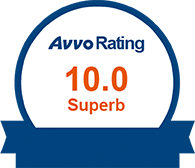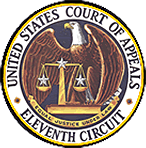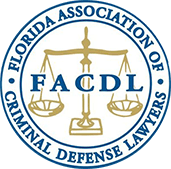
Your Case Deserves Immediate Attention - Call Hubbs Law Today
Violent Career Criminal
Florida ranks among one of the most violent states in the country. For example, in 1996 the State of Florida had the highest violent crime rate of any state, exceeding the national average by 66 percent. Despite the number of report violent crimes in Florida, the state ranks lower in incarceration rates than many other states with lower violent crime rates.
For example, in 1997, only 15.6 percent of all persons convicted of a felony were sentenced to state prison. The state had the second lowest rate of incarcerated felons since 1984. For the next seven out of eight years, Florida’s rate of incarceration for felons continued to decline.
The Florida legislature wanted to give priority to the incarceration of career criminals for extended prison terms. The prospect of extended prisons terms with substantial minimum terms of imprisonment was expected to incapacitate the offender, thereby preventing future crimes and reducing the violent crime rate. Priority was also given to incarcerating criminals who use guns during the commission of violent crimes.
Florida Statute §775.084 for Violent Career Criminals was created to address these concerns. The statute for Violent Career Criminals includes provisions for:
- Habitual Felony Offenders;
- Habitual Violent Felony Offenders; and
- Three-Time Violent Felony Offenders.
Habitual Felony Offender
The definition of “Habitual Felony Offender” is a defendant for whom the court may impose an extended term of imprisonment, as provided in paragraph §775.084 (4)(a), if it finds that:
- The defendant has previously been convicted of any combination of two or more felonies in this state or other qualified offenses.
- The felony for which the defendant is to be sentenced was committed:
- While the defendant was serving a prison sentence or other sentence, or court-ordered or lawfully imposed supervision that is imposed as a result of a prior conviction for a felony or other qualified offense; or
- Within five years of the date of the conviction of the defendant’s last prior felony or other qualified offense, or within five years of the defendant’s release from a prison sentence, probation, community control, control release, conditional release, parole or court-ordered or lawfully imposed supervision or other sentence that is imposed as a result of a prior convictions for a felony or other qualified offense, whichever is later.
- The felony for which the defendant is to be sentenced, and one of the two prior felony convictions, is not a violation of s.893.13 relating to the purchase or the possession of a controlled substance.
- The defendant has not received a pardon for any felony or other qualified offense that is necessary for the operation of this paragraph.
- A conviction of a felony or other qualified offense necessary to the operation of this paragraph has not been set aside in any post-conviction proceeding.
Habitual Violent Felony Offender
Under Florida law, the term "Habitual Violent Felony Offender" is defined as a defendant for whom the court may impose an extended term of imprisonment, as provided in paragraph §775.084 (4)(b), if it finds that:
The defendant has previously been convicted of a felony or an attempt or conspiracy to commit a felony and one or more of such convictions was for:
- Aggravated battery; or
- Aggravated assault with a deadly weapon;
- Aggravated abuse of an elderly person or disabled adult;
- Aggravated stalking;
- Aggravated child abuse;
- Kidnapping;
- Robbery;
- Sexual battery;
- Armed burglary;
- Unlawful throwing, placing, or discharging of a destructive device or bomb;
- Arson;
- Aggravated manslaughter of a child;
- Aggravated manslaughter of an elderly person or disabled adult;
- Manslaughter; and
- Murder.
- The felony for which the defendant is to be sentenced was committed:
- While the defendant was serving a prison sentence or other sentence, or court-ordered or lawfully imposed supervision that is imposed as a result of a prior conviction for an enumerated felony; or
- Within five years of the date of the conviction of the last prior enumerated felony, or within five years of the defendant's release from a prison sentence, probation, community control, control release, conditional release, parole, or court-ordered or lawfully imposed supervision or other sentence that is imposed as a result of a prior conviction for an enumerated felony, whichever is later.
- The defendant has not received a pardon on the ground of innocence for any crime that is necessary for the operation of this paragraph.
- A conviction of a crime necessary to the operation of this paragraph has not been set aside in any post-conviction proceeding.
Three-Time Violent Felony Offender
Under Florida law, the term "Three-Time Violent Felony Offender: a defendant for whom the court must impose a mandatory minimum term of imprisonment, as provided in paragraph §775.084 (4)(c), if it finds that:
The defendant has previously been convicted as an adult two or more times of a felony, or an attempt to commit a felony, and two or more of such convictions were for committing, or attempting to commit, any of the following offenses or combination thereof:
- Carjacking;
- Home invasion/robbery;
- Aggravated stalking;
- Aggravated battery;
- Armed burglary;
- Unlawful throwing, placing, or discharging of a destructive device or bomb;
- Aggravated manslaughter of a child;
- Aggravated manslaughter of an elderly person or disabled adult;
- Arson;
- Robbery;
- Kidnapping;
- Aggravated child abuse;
- Aggravated abuse of an elderly person or disabled adult;
- Aggravated assault with a deadly weapon;
- Sexual battery;
- Manslaughter; and
- Murder.
- An offense which is in violation of a law of any other jurisdiction if the elements of the offense are substantially similar to the elements of any felony offense enumerated in sub-subparagraphs a. – q.; or an attempt to commit any such felony offense.
- The felony for which the defendant is to be sentenced is one of the felonies enumerated in sub-subparagraphs 1.a – q. and was committed:
- While the defendant was serving a prison sentence or other sentence imposed as a result of a prior conviction for any offense enumerated in sub- subparagraphs 1.a. – r.; or
- Within five years after the date of the conviction of the last prior offense enumerated in sub- subparagraphs 1.a. - r., or within 5 years after the defendant's release from a prison sentence, probation, community control, or other sentence imposed as a result of a prior conviction for any offense enumerated in sub-subparagraphs 1.a. - r., whichever is later.
- The defendant has not received a pardon on the ground of innocence for any crime that is necessary for the operation of this paragraph.
- A conviction of a crime necessary to the operation of this paragraph has not been set aside in any post-conviction proceeding.
Violent Career Criminal
The term "Violent Career Criminal" is defined as a defendant for whom the court must impose imprisonment pursuant to paragraph §775.084 (4)(d), if it finds that:
- The defendant has previously been convicted as an adult three or more times for an offense in this state or other qualified offense that is:
- Any forcible felony, as described in s.776.08;
- Aggravated stalking, as described in s.784.048(3) and (4);
- Aggravated child abuse, as described in s.827.03(2);
- Aggravated abuse of an elderly person or disabled adult, as described in s.825.102(2);
- Lewd or lascivious battery, lewd or lascivious molestation, lewd or lascivious conduct, or lewd or lascivious exhibition, as described in s.800.04 or s.847.0135(5);
- Escape, as described in s.944.40; or
- A felony violation of chapter 790 involving the use or possession of a firearm.
- The defendant has been incarcerated in a state prison or a federal prison.
- The primary felony offense for which the defendant is to be sentenced is a felony enumerated in subparagraph 1. and was committed on or after October 1, 1995, and:
- While the defendant was serving a prison sentence or other sentence, or court-ordered or lawfully imposed supervision that is imposed as a result of a prior conviction for an enumerated felony; or
- Within 5 years after the conviction of the last prior enumerated felony, or within five years after the defendant's release from a prison sentence, probation, community control, control release, conditional release, parole, or court-ordered or lawfully imposed supervision or other sentence that is imposed as a result of a prior conviction for an enumerated felony, whichever is later.
- The defendant has not received a pardon for any felony or other qualified offense that is necessary for the operation of this paragraph.
- A conviction of a felony or other qualified offense necessary to the operation of this paragraph has not been set aside in any post-conviction proceeding.
- Qualified Offense: any offense, substantially similar in elements and penalties to an offense in this state, which is in violation of a law of any other jurisdiction, whether that of another state, the District of Columbia, the United States or any possession or territory thereof, or any foreign jurisdiction, that was punishable under the law of such jurisdiction at the time of its commission by the defendant by death or imprisonment exceeding 1 year.
- For the purposes of this section, the placing of a person on probation or community control without an adjudication of guilt shall be treated as a prior conviction.
| HFO | HVFO | VCC | PBL | |
|---|---|---|---|---|
| Sentencing | Discretionary | Discretionary | Discretionary | Mandatory |
| Gain Time | Eligible | Eligible | Eligible | Ineligible |
Third Degree Felony | Up to ten years in prison | Up to ten years Ineligible for early release during first five years of the sentence | Up to fifteen years in prison. Ineligible for early release during the first ten years of the sentence | Up to five years in prison. Ineligible for early release and must serve 100% of the sentence |
Second Degree Felony | Up to 30 years in prison. | Up to thirty years in prison Ineligible for early release during first ten years of the sentence | Up to forty years in prison Ineligible for early release during first thirty years of the sent | Up to fifteen years in prison Must serve 100‰ of the sentence and ineligible for early release |
|---|
Third Degree Felony | Life in prison | Up to thirty years in prison first ten years of the sentence | Life in prison | Up to thirty years in prison Ineligible for early release and must serve 100% of the sentence |
|---|
| Life Felony | Life in prison | Up to life in prison. Ineligible for early release during the first 15 years of the sentence. | Life in prison | Up to life in prison Ineligible for early release and must serve 100% of the sentence |
|---|---|---|---|---|
Additional Resources
- National Domestic Violence Hotline– The Domestic Violence Hotline was founded from a grant from the Administration on Children, Youth, and Families and the U.S. Department of Health and Human Services. Find information on a domestic violence hotline that can be reached 24 hours a day 7 days a week by phone call, text, or chat.
- Miami-Dade County State Attorney’s Office- the Miami-Dade State Attorney’s Office prosecutes individuals who are charged with crimes related to domestic violence.
- Florida Courts- Find information on filing an injunction for protection against domestic violence.
- Department of Children and Families (DCF)- get domestic violence information from the Department of Children and Families who is the Florida agency tasked with protecting children in domestic violence situations. DCF has a domestic violence hotline that can be used 24/7.
- Miami-Dade Clerk of Court- find information on filing an injunction for protection against domestic violence in Miami-Dade County.

Attorneys E.J. & Erika Hubbs
As professional Miami criminal defense attorneys, we take every case personally give every client the deliberate care it deserves. Our clients become part of our family and we fight relentlessly for their rights. Read more about us to find out how we can help you.

-
He is very knowledgeable, and he will fight to clear your name.
J Multidor -
Me and my wife were instantly pleased with her knowledge and professionalism
Carlos Urbina -
"On the personal note she treats you like family and I recommend her to anyone that needs help."Gabriel M.














